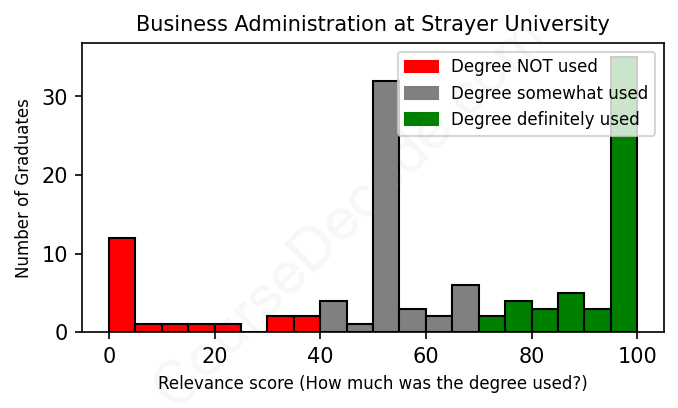
First, some facts. Of the Business Administration graduates from Strayer University we've analyzed , here's how many have used (or NOT used) their degree in their career:

These are estimates based on AI analysis of 120 LinkedIn profiles (see below).
The verdict? Slightly below average. Overall, with an average relevance score of 63%, Business Administration graduates from Strayer University have a slightly lower likelihood (-4%) of finding work in this field compared to the average graduate across all fields:
And for comparison, here's the chart for all profiles we've looked at across all degrees.
Also, after graduating, only 19% of these graduates have pursued further education other than another Bachelor's degree (such as a Masters degree or other), compared to the average across all profiles of 35%. This suggests a Bachelors degree is enough for most Business Administration graduates, and it's normal to look for work straight after graduation.
See the details:
|
Relevance score: 95% We think this person has gone into a career highly relevant to their degree. We think this person has gone into a career highly relevant to their degree.
DEGREE INFOGraduated in 2012 from Strayer University with a Bachelors Degree in Business Administration. No other secondary education since. JOB HISTORY SINCE GRADUATIONTerritory Account Coordinator Mobile Mini Inc Oct 2013 - Aug 2015 National Accounts  Mobile Mini Inc Oct 2013 - Present Inbound Sales Specialist  Mobile Mini Inc Sep 2014 - Present ABOUTLooking for a rewarding career with possibly of working remote. Very career oriented and dedicated. I don't mind putting in the extra time and effort to make sure my customers and employer are well taken care of. |
The top 10 most common jobs done by the graduates we've analyzed (ranked most common to least) are:
After analyzing the job trajectories of graduates from Strayer University who completed degrees in Business Administration, it's clear that the landscape is quite diverse, ranging from management roles to customer service positions. Many graduates have taken up roles directly related to business functions, but a significant number have ventured into fields where their degree's relevance is more tenuous. For example, jobs like Warehouse Manager and Operations Manager involve core business skills such as logistics and operational efficiency, directly tying back to business administration studies. However, roles like Caregiver or Customer Service Representative suggest a disconnect, as these positions do not require the extensive knowledge and skills typically associated with a Business Administration degree.
It’s fascinating to see that some of the most common jobs held by these graduates, such as Managers in various sectors or roles centered around sales, do utilize aspects of business administration—like operational management, strategic planning, and customer engagement. Positions like Project Manager or Account Manager are where you really see the skills from their degree being applied effectively. On the flip side, many graduates have also taken roles in fields like healthcare, teaching, and technical positions, which, while they may benefit from some business knowledge, do not primarily engage with the core principles taught in a Business Administration program. Hence, while many jobs align well with the degree, a substantial number of roles taken by these graduates indicate varying degrees of relevance concerning their education in Business Administration.
Overall, while it's evident that many Strayer University graduates find themselves in positions that leverage their business education, a notable portion also ends up in roles unrelated to business management. This reality highlights the importance of actively seeking opportunities that align closely with educational backgrounds to maximize the potential benefits of their degree. The mix of job types reinforces the notion that a business degree can open a wide range of career doors, but the actual paths taken can vary significantly depending on individual choices, economic factors, and personal interests.
Here is a visual representation of the most common words in job titles for Business Administration graduates (this is across all Business Administration graduates we've analyzed, not just those who went to Strayer University):

Okay, so let's break down what kind of career paths Strayer University graduates, specifically those with degrees in Business Administration, seem to follow. From the wide range of LinkedIn profiles I've looked at, it’s pretty clear that these graduates often find themselves in a variety of roles, but the story isn’t the same for everyone. Some alumni really nail it with solid, well-aligned career trajectories, while others seem to drift a bit away from what you might expect with a business degree.
First off, let's talk about what many graduates are doing right after they toss their caps in the air. A lot of them start in entry-level positions that are at least adjacent to their field. For instance, you’ll see roles like Customer Service Representative, Loan Specialist, or Operations Manager popping up as early jobs. These positions can be decent starting points for building experience and skills relevant to business. However, there are also quite a few cases where graduates land in jobs that feel a little disconnected from the core principles of business administration—for instance, positions like Caregiver or roles in the service industry that aren’t as focused on business management or operations.
Fast forward five to ten years, and the picture becomes a little clearer but still mixed. We see a notable number of graduates climbing the ladder into managerial or specialized roles—like Operations Manager, Warehouse Manager, or even getting into fields like Real Estate or Lending. This suggests that those who start on a more conventional path tend to progress into positions that leverage their business education. On the other hand, some graduates still find themselves in positions that feel like a far cry from what they might have expected when they enrolled in a Business Administration program. For example, people staying in customer service roles for several years or shifting into completely unrelated fields raises questions. While it's great to see success stories, there’s also a noticeable trend of graduates who appear to be navigating careers that don’t directly utilize the skills they honed in school.
In summary, it looks like the trajectory for Business Administration grads from Strayer University is a mixed bag. While some find meaningful careers that align well with their education, others seem less anchored in the core objectives of a business degree. It might not be a straight path for everyone, but there are definitely examples of individuals making it work and finding success in various business-related roles. So, as you think about your own career plans, take a hard look at the choices others have made. Strive to carve out a path that resonates with your ambitions, even if it means stepping slightly off the beaten path of what’s traditional!
Getting a Bachelor’s degree in Business Administration at Strayer University is generally considered to be on the more manageable side compared to some other programs. Strayer is known for its flexible online courses and accessibility, which makes it easier for students, especially those juggling work or family. The curriculum covers a lot of important topics, like finance, marketing, and management, but with the right dedication and time management, most people find they can handle the workload. It’s definitely challenging in some areas, but a lot of students appreciate the support from instructors and fellow classmates, which helps make the journey smoother. So, if you’re organized and willing to put in the effort, it shouldn't be too tough!
Most commonly, in the LinkedIn profiles we've looked at, it takes people 4 years to finish a Bachelor degree in Business Administration.
When looking at these Strayer University graduates and their career paths, it seems like many of them have landed decent jobs that could provide a solid income. For instance, roles like Operations Manager, Senior Analysts, and even Warehouse Management typically come with salaries that can range from $60,000 to over $100,000 depending on the industry and experience. Additionally, some graduates have climbed up the ladder fairly quickly, showing that they’re likely earning good money now, especially those in management and specialized roles.
On the flip side, there are also a decent number of graduates who took on customer service or entry-level roles, which usually pay less, particularly in their earlier careers. But a common trend among many of these profiles is that they’re moving up over time, which suggests that they’re likely starting to see better pay after gaining experience in the field. Overall, while some may be starting off on the lower end of the pay scale, the potential for better pay seems to grow as they gain more expertise and move into management or specialized positions.
Here is a visual representation of the most common words seen in the "about" section of LinkedIn profiles who have a Bachelor degree in Business Administration (this is across all Business Administration graduates we've analyzed, not just those who went to Strayer University). This may or may not be useful:

Here are all colleges offering a Bachelor degree in Business Administration (ordered by the average relevance score of their Business Administration graduates, best to worst) where we have analyzed at least 10 of their graduates: